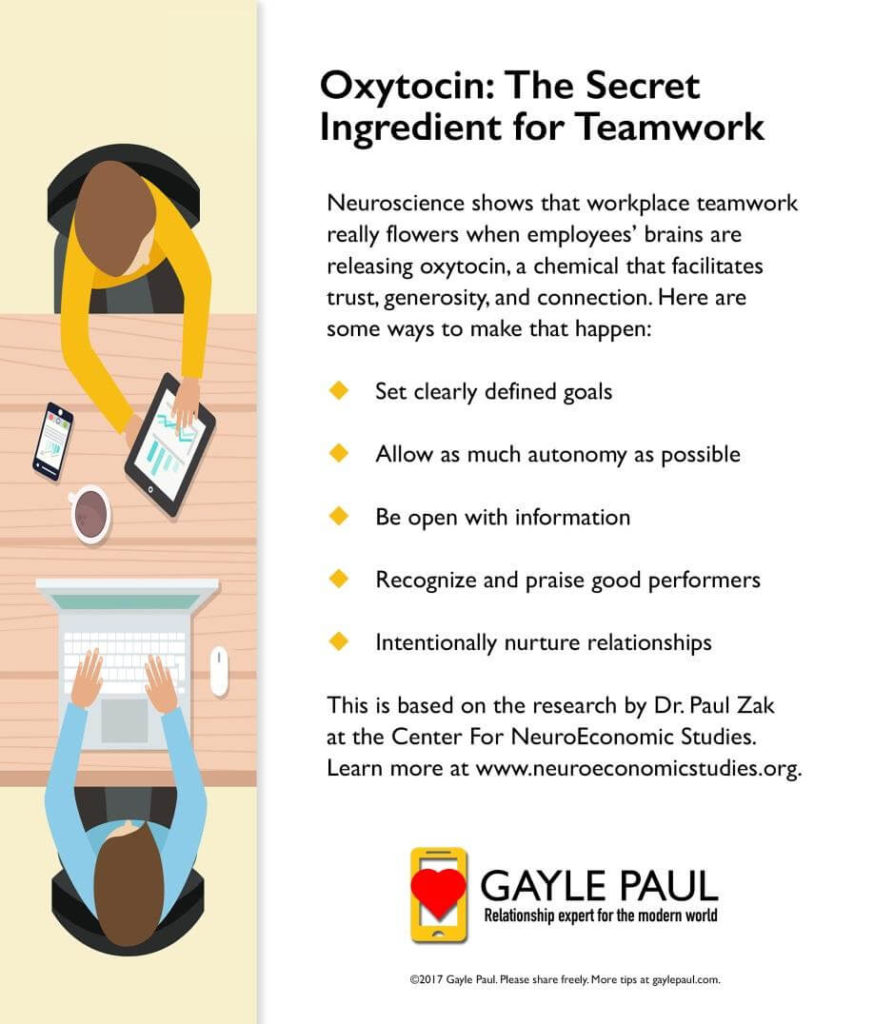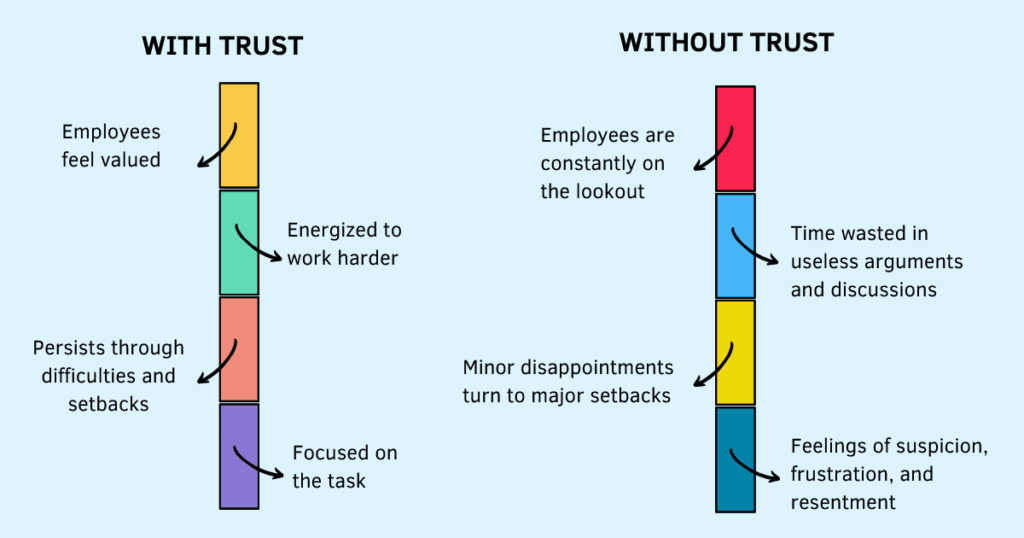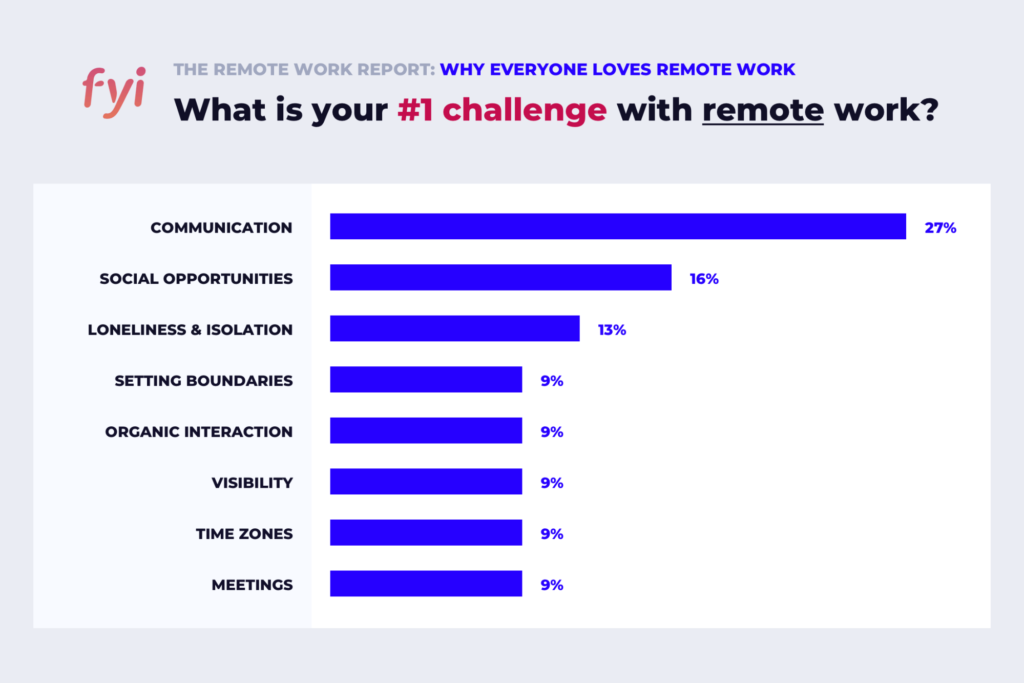Keys to Success in a Remote Team: Tips for Building Trust and Communication

It’s very easy to affirm that trust and communication are essential in any team, but is there a magic formula behind it? After all, as humans, we are constantly trying to keep ourselves safe. Therefore, building trust can be especially difficult to maintain in a remote team.
In a remote team, you can’t just pop into someone’s office to ask them a question – you have to rely on tools like email, chat, and video conferencing to communicate with your colleagues and employees. This can make it difficult to build trust and relationships with your coworkers, but fear not!
This blog post will discuss the keys to success in a remote team and how you can use that magic tool called technology to build trust and communication with your colleagues.
Stay tuned!

The Science Behind Trust (Yes, TRUE science)
No, this is not about wearing lab goggles to mix some “mysterious” ingredients to get your remote team to trust each other. This is about neuroscience and how our brains are actually wired up to trust people! You don’t believe us? Well, let’s give you some *real* scientific evidence to back us up.
The neuroscience of trust, especially the work by the neuro-economy professor, Dr. Paul Zak, has discovered that when we trust someone, the brain releases oxytocin – also known as the “cuddle hormone” or the “love hormone“. Oxytocin is associated with bonding, social interactions, and trust. It’s what makes us feel good when we’re around people we trust and care about!
More oxytocin is released in the brain when one is trusted more by others
Before Dr. Paul Zak’s work, this chemical compound was not linked to human social behaviors. Hence, his team devised a method to activate and gauge the brain’s acute oxytocin production through quick blood tests. And do you know what they found?
They learnt that the brain releases oxytocin when one is purposefully trusted, even by an unfamiliar person! This lessens the customary apprehension we experience while engaging with strangers and improves our capacity to comprehend their feelings.
Oxytocin’s improved empathy makes it possible for people to establish teams more easily and collaborate successfully
Down below, Dr. Paul gives you a sneak peek of what we can do to release some oxytocin and build trust in your team!

Trust is essential for any team, whether remote or in-person
Let’s review what trust is about!
Trust is the confidence in the reliability, truth, ability, or strength of someone or something. It can also be defined as a belief that someone or something is good and honest. Trust is often built over time through positive experiences.

For a team to be successful, trust must be established between team members and managers. Are your managers trustworthy?
The Importance of Trust between Managers and Employees
Did you know that the financial aspects of a company can be impacted by the level of trust? According to a Watson Wyatt study, this is a fact as it’s been proved that high-trust firms outperformed low-trust ones in terms of total return to shareholders by 286%!
A high sense of purpose and trust are two of the most important aspects of a successful remote team.
For a remote team to be effective, the manager must trust that the employees are capable of completing their work tasks without close supervision. Likewise, employees must trust that their manager has faith in their ability to complete assigned tasks.

When trust is present in a remote team, employees feel comfortable communicating openly with their managers about both successes and challenges.
Employees who feel trusted by their managers are also more likely to trust their colleagues, which leads to improved collaboration and a more positive work environment.

Therefore, it is evident that trust not only makes working relationships better but also makes individuals more productive! So, how can you use this information to build trust in your remote team and become a high-trust organization?
Tips for Building Trust in a Remote Team
As we promised, here are some tips on how to use the trust hormone to get your team working like a well-oiled machine!
Let’s release some oxytocin, shall we?
Encourage Open Communication
Remote work seems like it’s the perfect fit for everyone, but in reality, remote employees struggle with some challenges. According to a survey conducted by Nira, a real-time access control system that proactively secures company documents, lack of communication is the #1 challenge while working remotely.

Therefore, encouraging an open and safe space for communication is crucial to building trust among team members. This means creating an environment where employees feel comfortable sharing their thoughts and ideas without judgment.
When team members feel like they can openly communicate with each other, it leads to a more productive and innovative work environment
Encourage employees to use video conferencing rather than just audio when possible so that they can see each other’s facial expressions and body language. This will help team members feel more connected to each other and build trust more quickly.
Create Spaces for Social Interactions
One way to release oxytocin is by encouraging social interactions among team members. This can be done by hosting regular virtual happy hours, coffee chats, or lunch breaks.
These small trust-building moments will allow team members to get to know each other on a personal level and build relationships that extend beyond work.
Create a Sense of Unity
It’s important for team members to feel like they are part of a community and that they have a shared sense of purpose. This can be done by ensuring everyone is aware of the company’s mission and values, so make sure to always be clear about your company’s culture.
When team members feel like they are working towards a common goal, they are more likely to trust and cooperate.
Set Clear Goals
When everyone is working towards the same objectives, it becomes easier to trust that everyone is doing their part. In addition, clear goals help to hold team members accountable and create a sense of ownership.
Furthermore, setting clear goals allows team members to give and receive feedback more effectively, which can further build trust. By taking the time to set clear goals, you can lay the foundation for trust within your remote team.
Regular Feedback
Giving and receiving feedback is an important part of trust-building. Feedback helps team members understand how they are performing and where they need to improve.
When giving feedback, be sure to focus on the behavior rather than the person. For example, “I noticed that you didn’t respond to my emails yesterday” is better than “You’re so lazy.”
In addition, avoid giving criticism that is vague or based on personal opinion. For example, “I don’t like the way you did that” is not as helpful as “Can you try doing it this way instead?”
By taking the time to give clear and concise feedback, you can help build trust within your remote team.
Recognize Good Work
In addition to giving feedback, it’s also important to recognize when team members are doing a good job. This helps to build trust by showing employees that their hard work is appreciated.
There are many different ways to give recognition, such as sending a thank-you note, giving a shout-out in a meeting, or awarding points that can be redeemed for prizes. Nowadays, there is an infallible recognition method that goes by the acronym of R.I.S.E:
- Regular: Make it a habit to give trust-building feedback regularly
- Immediate: Take advantage of teachable moments to give trust-building feedback
- Specific: Recognition should specifically state what the employee did that impressed you or reflected the company’s value.
- Encouraging: Acknowledgements should inspire confidence. Every employee deserves to be recognized in a way that has the greatest personal meaning for them.

By using the R.I.S.E. method, you can effectively recognize good work and build trust within your remote team.
Set a Remote Workforce Leader
One of the most important trust-building tips is to appoint a remote workforce leader. This person will be responsible for ensuring that everyone on the team is working towards the same goal.
In addition, the remote workforce leader will be responsible for giving regular feedback and recognizing good work. By appointing a remote workforce leader, you can help build trust within your team.
You can either employ someone to fill this position or give it to a team member as the team manager.
- A remote workforce leader’s responsibilities include the following:
- Assess the culture of the remote workforce
- Make sure that the staff members are properly collaborating remotely.
- Create online team-building activities for the employees, such as a book club, a movie quiz, a sports-related video chat, or anything else you think they’d enjoy.
Autonomy and Delegation
When you manage a remote team, it’s important to find the balance between autonomy and delegation.
Giving your team members too much freedom can lead to confusion and a lack of direction, while micromanaging every task can lead to frustration and a loss of trust. The key is to delegate tasks and project management in a way that builds trust and allows your team to take ownership of their work.
Ultimately, the goal is to create an environment in which your team members feel trusted and empowered to do their best work
Start by clearly defining expectations and deadlines, and then provide regular feedback on progress. As your team gains experience and demonstrates their ability to meet commitments, you can begin to delegate more responsibilities.
Encourage Accountability
Another way to encourage trust in a remote team is to promote accountability. When team members know that they will be held accountable for their actions, they are more likely to work cooperatively and responsibly.
Furthermore, accountability can help to build respect and trust between team members. As a result, managers should not only encourage responsibility, but also they need to be held accountable when they side-track.
Use Automated Tools
Yes, building trust in a remote team can be difficult, but luckily some tools can help employees stay connected and collaborate effectively. For example:
- A project management tool can help team members keep track of deadlines and progress on tasks.
- A chat tool like Slack can help employees communicate and collaborate in real-time, even when they’re not in the same location.
- And a timesheet tool can help managers see exactly how much time employees are working on projects.
In addition, automated tools like Monitask can help build trust by giving employees transparency into what others are working on. By using these tools, you can make it easier to build trust within your remote team.
Be Transparent About Company Changes
Finally, one of the most important trust-building tips is to be transparent about company changes!
Let them know what the changes are and why they’re being made. If there are any changes in the works, make sure to communicate this to your remote team as soon as possible
This will help to build trust and understanding between you and your team. Additionally, it’s important to be open and honest about any challenges or setbacks that the company is facing. After all, your remote team is also an essential part of your company’s success.
Wrapping Up
While all these tips are great and can guarantee you a trustworthy relationship with your remote employee, it’s important to remember that you should always strive to have a healthy workplace culture.

After all, how can you ask something from your employees that your company is not offering or facilitating? As well, remember that long-lasting trust is built over time, so if you’re looking to create trust within your remote team, be patient and consistent.
Trust is an essential ingredient for any successful team, so don’t forget to put some of these trust-building strategies into practice today! Your remote workforce, and your ROI, will thank you for it.
Do you have any trust-building tips that you would add to this list? Let us know and happy teamwork!


